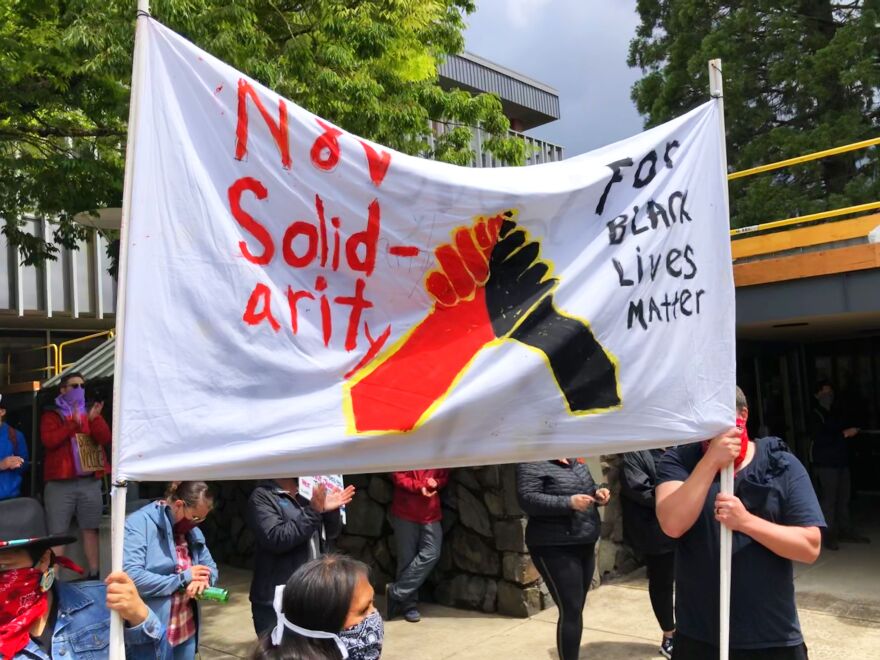More than a thousand activists gathered at the Wayne Morse Free Speech Plaza Sunday, to discuss justice reform beyond marches and rallies.
As seen in previous events across Eugene this past week, there were chants, speeches, and marches. Co-organizer Andres Ascencio of the Black Indigenous People of Color (BIPOC) Liberation Committee says they have another aim that’s more long term, which is what today's "Speak Their Name" event was largely about.
“We just want to educate folks and teach them what they can do to fight systemic racism," Ascencio tells KLCC. "There’s a lot more to be done outside of just posting a black square on Instagram. That doesn’t promote change, but affirmative action does.”

A “teach-in” about Oregon’s racist history was later held outside the U of O’s Deady Hall. Its namesake, Matthew Deady, was a pro-slavery judge and co-founder of the university. And calls have been renewed recently to remove his name from the building.
Roughly 300 members of the original crowd then marched to the Eugene Police Department, where they chanted to protest police brutality. They removed taped-on hearts and messages of car from a community group from a boarded-up area in the front, replacing them with posters and fliers, or spray-painted graffiti.
“There is a difference between the free speech rally of the larger group of protesters we saw, and the few individuals who came to deface our police building,” said Chief Chris Skinner in an EPD release.
“It is important that people know the difference. The larger Black Lives Matter protest group has been self-regulating, careful with traffic and holding rallies. Out of respect for the Black Lives Matter protesters and to avoid disrupting the larger, lawful, group, we refrained from taking any action to contact the unidentified individuals committing criminal acts against our police facility. I am disappointed with the actions of the few who came with ill intent and we will investigate this incident.”
Eugene Public Works crews arrived to repair the damage after the crowd left at about 4 p.m.
Unified Under One Cause
Speakers also highlighted systemic prejudice against the LGBTQ community, and Indigenous people.
Angela Noah is a member of the White Mountain Apache. She spoke of missing and murdered indigenous women, and her mother’s own attempts to shelter her and her siblings from police brutality.
“The sheltering and hush-hush was something I realized is exactly what this country wants," Noah told the crowd. "And that this a survival response from trauma.
"This country, this stolen land, this colonized government that profits white supremacists and exploits the love and labor of my black and brown relations.”
More than 5,700 Native American and Alaskan native women and girls have gone missing and murdered in North America.

BIPOC organizers say they’re also wanting people to get involved in education and politics, to create meaningful and long-term change on the grassroots level.
Confronting Eugene's Homogeneity
For more than a week, protests, rallies, and marches have been held across Eugene, largely focused on equality and justice for African-Americans.
But Eugene’s lack of diversity was also called out during the event.
19-year-old Zahjahne Sanchez spoke of being one of the few black students in school growing up, and the expectations placed on them.
“Every time I would walk down the hallways, it seems that if I did see other black people it was always competition. It was competition, comparison. Who’s the better black girl, who’s the better dancer? Who’s the better twerker? Who can do this, who can do that? Who’s the smartest?" recalled Sanchez.
"It was irritating, I didn’t want to be all that, I didn’t want to fall under your guys’ stereotypes.”
Sanchez recalled being called the N-word by another child in 4th grade. She says she’s worked to improve representation of diversity in recent years, and to speak out.
83 percent of Eugene’s population is white.
Copyright 2020, KLCC.






